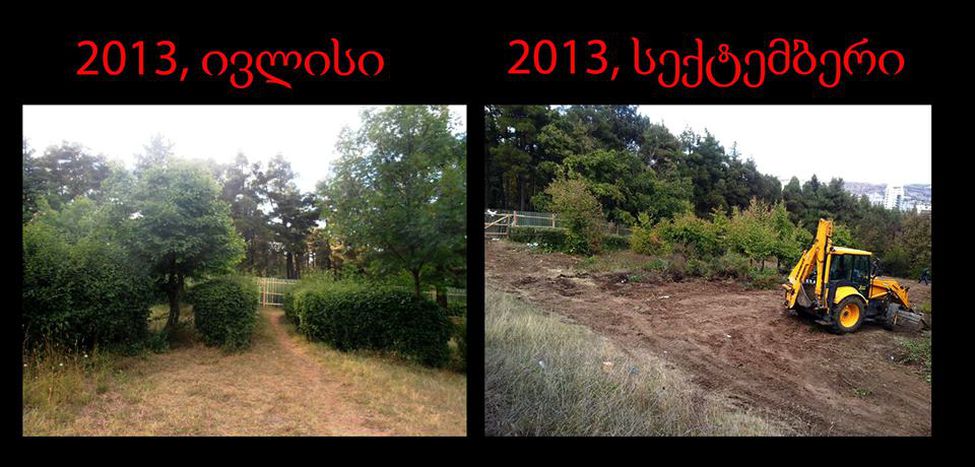
Environmentalists occupy Tbilisi
Published on
In Tbilisi, Georgia, where the noise and exhaust from the heavy traffic can leave you dizzy and short of breath, community members are concerned that the local government’s policies will soon leave them without trees for oxygen or green parks where they can bring their children.
On the 30th September 2013 a crowd of activists gathered in front of Tbilisi’s main concert hall, demanding an end to the destruction of their city’s public parks and green spaces. In Tbilisi, Georgia, where the noise and exhaust from the heavy traffic can leave you dizzy and short of breath, community members are concerned that the local government’s policies will soon leave them without trees for oxygen or green parks where they can bring their children. Despite the crowded square filled with supporters, the activists are notably frustrated and disconcerted, sighting a lack of interest on the part of the government and a fear that the vested interests of those selling the land will trump concern for public health and wellbeing. Many in Tbilisi’s burgeoning environmentalist movement believe that, despite weekly demonstrations and numerous petitions, the government is not taking their demands seriously. Instead, trees are being chopped down at an alarming rate as public land is sold to private companies for a pittance.
A Movement Emerges
While the unregulated sale of private land has been a problem in Georgia since the 1990s, the recent sale of a plot of land near Tbilisi’s Turtle Lake caused the city’s environmental movement to grow and intensify unexpectedly over the past several weeks, drawing a larger crowd of supporters than ever before. According to local residents, the City Council’s decision to sell the designated recreational zone located in the Ciyvebi area is illegal. Seeing how the government’s decisions are directly affecting their neighbourhood, many community members who had never been involved in an environmental movement before began to mobilize and join forces with members of Tbilisi’s Guerrilla Gardening group. After years of inaction, local activists suddenly adopted Occupy Wall Street style tactics, setting up tents on the land where trees were being razed to make space for a new restaurant.
The activists are now demanding that the local government place a moratorium on the sale of public land until the Tbilisi City Council addresses the legality of these sales, but it remains to be seen whether the government will respond to this demand. According to Erekle Urushadze, a local activist and representative of the non-governmental organization Transparency International, very little effective action has been taken despite the fact that local city council members have agreed to meet with activists on several occasions. The city’s Guerrilla Gardening group hopes that with enough signatures, their petition will force the local government to sit up and listen. Although activists are irritated by the government’s inaction, a general attitude prevails that the time has come to put an end to the unbridled sale of natural resources. “It’s time the government realized that the future of the land is the future of the country and that natural resources are not just another piece of merchandise to be sold”, an activist explains passionately to a group of friends congregated in front of the concert hall waiting to sign the petition. As the movement’s numbers grow, so does the organizers’ faith that pressure from below will eventually force the government to change its policies. “Until now, people didn’t realize what was happening or they didn’t care”, complained Nino, a student from the Tbilisi State University. “The City Council will only be held responsible if a critical mass gets involved. Until then the illegal destruction of the city’s trees and the sale of public green spaces will continue”.
Natural Georgia
The policies of the previous government of President Mihkail Saakashvili, characterized by frequent changes in ministerial competencies and an unbridled free market agenda, made Georgia a difficult place to lobby for the protection of natural resources. After allegations of widespread corruption surfaced in 2011, the President ordered the complete restructuring of the Environmental Ministry. To the horror of Georgia’s environmentalists, control over the country’s natural resources was given to the Ministry of Energy. Shortly thereafter, the new Minister of Energy and Natural Resources Alexandre Khetaguri, introduced a new system of leasing forests, essentially assuring that no new protected areas would be created in Georgia and that everything from forests, lakes, and fields could be leased to private investors.
The natural beauty and diversity of the Caucasus, captured in David Attenborough’s documentary film ‘Wild Russia’, has an unrivalled potential for the development of sustainable tourism and scientific discovery. According to Giorgi Rajebashvili, a Tbilisi resident and former employee of the Georgian non-governmental organization Green Alternative who now runs his own sustainable tourism firm, “the Caucasus has a high proportion of endemic and limited-range flora and fauna, diverse landscapes that range from humid mountain forests and wetlands to high mountains and semi deserts, and viable populations of species endangered in the rest of the western Eurasia. Although Georgia covers only one-seventh of the Caucasus, it aggregates nearly every kind of habitat and biome found in the region. The country’s species diversity far surpasses two-thirds of the species found throughout the entire Caucasus, comprising nearly 1% of the planet’s animal and plant species”. The preservation of this diversity, however, is contingent on the government’s decision to prioritize conservation; and due to their proximity to the seat of power, it is up to Tbilisi’s residents to ensure that policy makers understand this.



